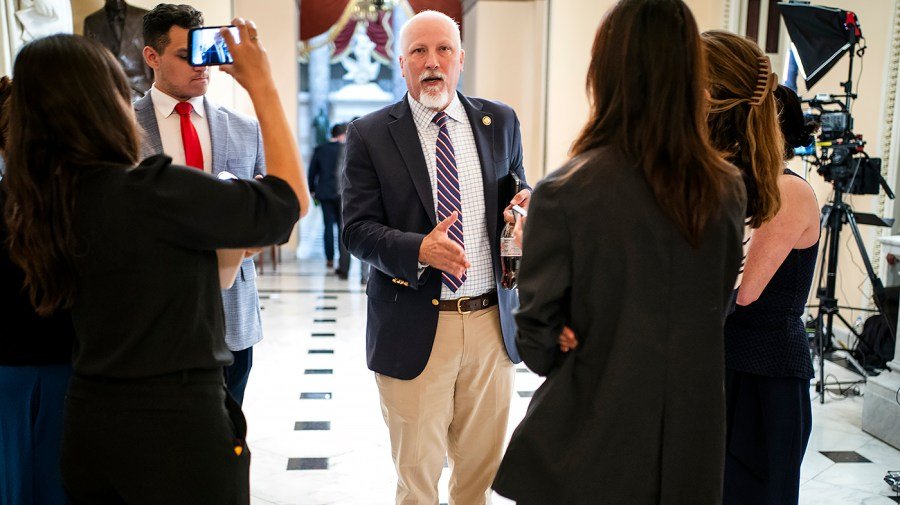
The Senate GOP’s version of the “big, beautiful bill” is facing major headwinds in the House as a growing number of lawmakers stake opposition to the legislation, a troubling sign for Republican leaders as they try to fast-track the package full of President Trump’s legislative priorities.
The Senate Finance Committee on Monday released the final piece of text for the upper chamber’s edition of the legislation. It changed key parts of the House’s blueprint, including beefing up Medicaid cuts, softening the rollback of green energy tax credits and decreasing the state and local tax (SALT) deduction cap — a troika of tweaks prompting significant pushback across the House GOP conference.
“My main takeaway for you guys is this bill, as the Senate has produced it, is definitely dead if it were to come over to the House in anything resembling its current form,” Rep. Chip Roy (R-Texas), a vocal member of the conservative House Freedom Caucus, told reporters on a press call.
He said GOP leadership’s self-imposed Independence Day deadline is “a real question at this point.”
“The bill won’t move through the House as it is,” the Texas Republican added. “You have a significant problem with respect to deficits. You have a significant problem with respect to the Inflation Reduction Act. You still have a problem, in my opinion, on Medicaid, even though it maybe made a slight move in the right direction. And then there’s a myriad other factors.”
Rep. Jeff Van Drew (R-N.J.), who switched from a Democrat to a Republican in 2020, also tore into the Senate’s bill, taking issue with a provision that would decrease the amount of Medicaid funding states receive.
“This is political stupidity; it’s political suicide. Why would you hurt these people?” Van Drew told The Hill. “There are a lot of working poor, blue-collar people. There are people now — they were part of this new Republican Party, and we should make sure that they’re safe not only for political reasons but also for the right thing to do.”
“I’m not voting for that. That’s gotta be straightened out,” he added of the Senate’s bill. “I would be a no. I can’t see myself voting for that.”
The early opposition is a harrowing state of play for Speaker Mike Johnson (R-La.), who can only afford to lose three votes and muscle the legislation through his razor-thin majority, assuming full attendance and unanimous Democratic opposition. The Speaker had not commented on the Senate’s text as of Tuesday evening.
The Senate, to be sure, can still tweak its bill to win over support, but that would require significant changes that leaders are signaling they have no appetite for.
On Medicaid, for example, some centrist House Republicans are griping about the upper chamber’s decision to cap provider taxes at 3.5 percent by 2031 — a decrease from the current 6 percent — for states that expanded the social safety net program under the Affordable Care Act. The decrease would begin in 2027 and be phased out by 0.5 percent annually.
Van Drew said he wants the provider tax to remain at 6 percent. He pointed to the House bill, which froze the provider tax at current rates while also implementing work requirements for nondisabled individuals.
“This will hurt people. That’s how simple the formula is,” Van Drew said of the Senate’s proposal. “You don’t want to hurt people that shouldn’t be hurt. This will hurt people that shouldn’t be hurt, because the hospitals are going to have to make cuts.”
Senate Majority Leader John Thune (R-S.D.), however, backed the provision Tuesday — even as some moderates in his own ranks express concerns — describing the reform as a way to “rebalance the program in a way that provides the right incentives to cover the people who are supposed to be covered by Medicaid.”
“But we continue to hear from our members specifically on components or pieces of the bill that they would like to see modified or changed or have concerns about, and we’re working through that,” he added. “But at the end, I mean, the goal is — as you all know — is to get 51 here in the United States Senate and 218 in the House, and so ultimately that’s the math that I’m working with, that we’re all working with. We want to get a bill out of the Senate, through the House and on the president’s desk.”
The Senate bill’s rollback of green energy tax credits, meanwhile, has emerged as a pain point on the right flank. The upper chamber’s legislation still takes a sledgehammer to many of the provisions enacted in the Democrats’ inflation Reduction Act (IRA), but it appears to offer more flexibility.
The legislation, for example, appears to eliminate a provision that would have required climate-friendly energy sources to begin construction within 60 days of the bill’s enactment to qualify for the credits, which was considered one of the most stringent energy conditions in the bill. Instead, the Senate’s measure requires projects, including solar panels and wind farms, to start construction by the end of this year to receive the full credit.
Roy — who warned for weeks that he would not support the legislation if it watered down the elimination of green energy tax credits approved by Democrats in 2022 — slammed the changes.
“We have major backsliding on the Inflation Reduction Act ‘green new scam’ subsidies,” he told reporters on a press call. “We’re trying to just get even half at this point of the reductions the IRA locked in place, and now the Senate is pushing back on that. That’s a real problem.”
That position aligns with the statement members of the Freedom Caucus board released earlier this month, after the House approved the megabill, warning they would “not accept” an attempt by the upper chamber to “water down, strip out, or walk back the hard-fought spending reductions and IRA Green New Scam rollbacks achieved in this legislation.”
Rounding out the House’s three main areas of concern is the Senate’s $10,000 SALT deduction cap, which is causing considerable consternation among moderate House Republicans from high-tax blue states.
Those lawmakers — mainly members hailing from New York, New Jersey and California — engaged in painstaking negotiations with Johnson for months to land on a $40,000 deduction cap for individuals making $500,000 or less.
Thune, for his part, told reporters Monday that the $10,000 cap is a “marker” for negotiations with House Republicans, adding that the two camps will “figure out a landing spot.”
But House Republicans in the SALT Caucus are warning they will not accept any cap below the $40,000 level, threatening to tank the entire package.
If SALT is not addressed by the end of the year, members have noted, the deduction cap would return to unlimited — where it was before the 2017 Trump tax cuts bill put the $10,000 cap in place — a reality they would be thrilled with.
“The $10,000 provision in the Senate bill is dead on arrival in the House,” Rep. Nick LaLota (R-N.Y.) told The Hill on Tuesday. “[It] does not acknowledge the hard work and compromise House members did for four months to get to $40,000 and the Senate has a choice now: It’s either $40,000 or unlimited, because anything less than $40,000 will crash the bill and SALT will come back as unlimited next year.”
He is offering his Senate colleagues an ultimatum:
“The ball is in the Senate’s court, but the time to negotiate on SALT is over, the House has already done that. … It’s now $40,000 or unlimited.”


